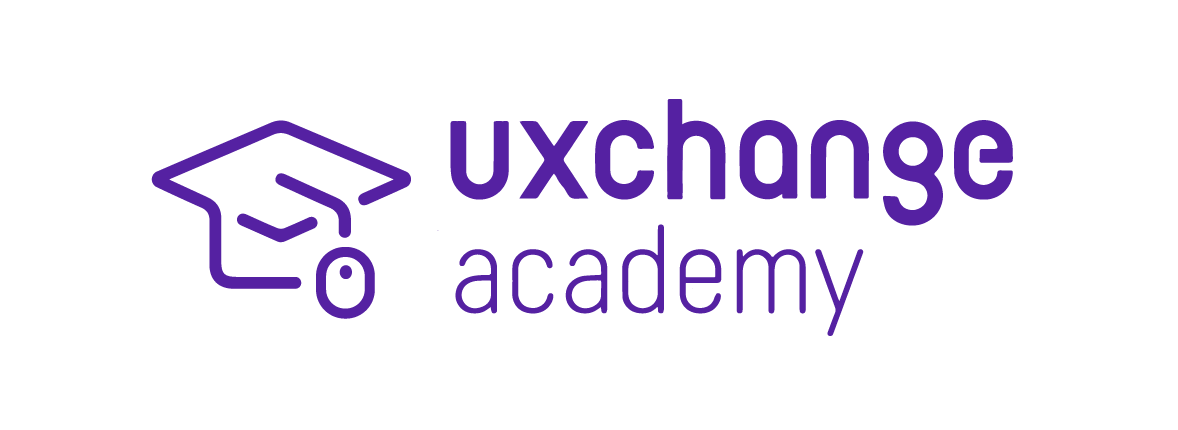Listening Deeply
Listening deeply is a powerful skill. Most people are surprised to learn how much their own inner voice and emotions distract them from truly hearing another person. This course teaches how to pay rapt attention. And it teaches when and why to do it.
Self-paced course
Closed captions
Last updated August 2025
Join Indi’s Slack community
6 month access
About the course
Listening is the foundation for inclusivity, for new opportunities to support more people, and also for powerful team efficiency. Having clear techniques for understanding a person’s interior cognition–for developing cognitive empathy–allows professionals the foundation for later finding patterns that will reveal gaps and inclusive, intentional direction for your solutions.
If you prefer:
There is a book that covers the same concepts, Time to Listen.
Course Sections:
Section 1 – Build Awareness
1.1 Meaningful Direction
1.2 Purpose Definition
1.3 Thinking Styles Definition
1.4 Preoccupied Listening
1.5 Deep Listening
1.6 Listening Deeply Frees You
1.7 That Word “Listen”
1.8 Assumptions or Empathy
1.9 Topics, Concepts, Layers
1.10 Interior Cognition
1.11 Getting Past Expression
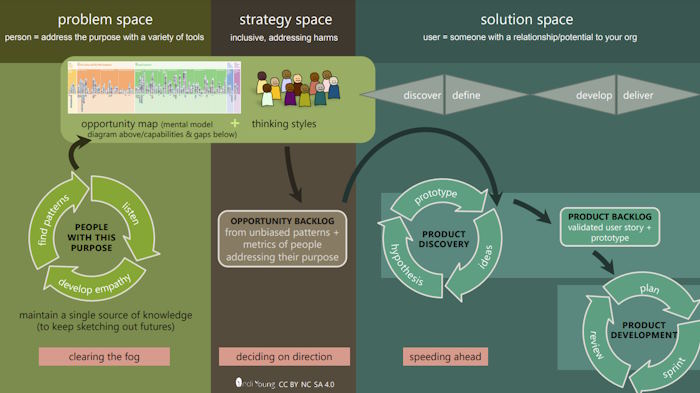
Section 2 – Listening Session Techniques
2.1 Starting a Session
2.2 The Germinal Question
2.3 How a Session Flows
2.4 Pull Tabs
2.5 Ask – What Went Through Your Mind
2.6 Ask – More About That
2.7 Ask – Fill in the Blank
2.8 Ask – Reflection
2.9 Ask – Why vs. Because
2.10 Pin to a Place & Time
2.11 Clarity – Find the Roots
2.12 Clarity – Passive Into Active
2.13 Avoid These Techniques
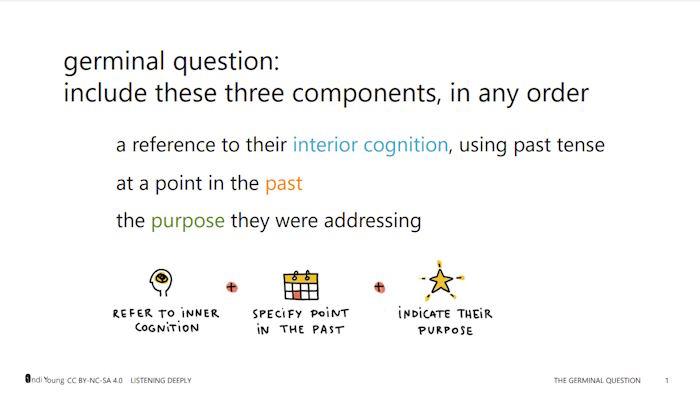
Section 3: Transitions & Safe Space
3.1 Shifting Topics
3.2 Instances of the Purpose
3.3 Ending a Session
3.4 Pay Rapt Attention After
3.5 Safe Space & Trust
3.6 Host a Safe Space – Recognize the Mood
3.7 Host a Safe Space – Show You Are Listening
3.8 Host a Safe Space – Avoid Judging
3.9 Host a Safe Space – Bring Warm Personality
3.10 Signals of Fading Safety
3.11 Exit an Unsafe Session
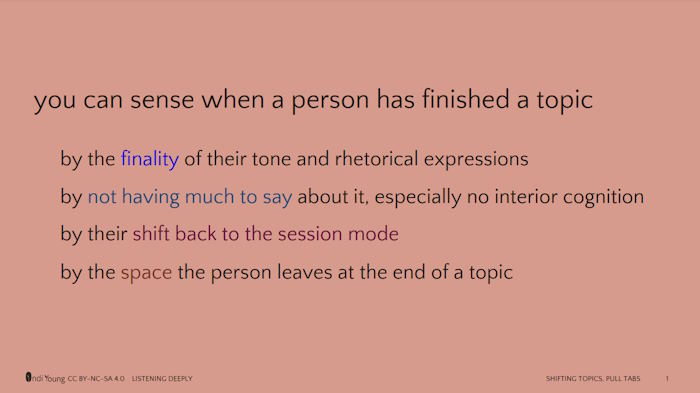
Section 4: Handling Complexity
4.1 Self-Care
4.2 Triggers & Thresholds
4.3 Sensitive Contexts
4.4 Fabrications & Lies
4.5 Complaints & Objections
4.6 Generalizations & Habits
4.7 Derailing & Recovery
4.8 Technical Difficulties
4.9 Planting the Seed
4.10 Preview – Data Synthesis
4.11 Preview – Opportunity Maps
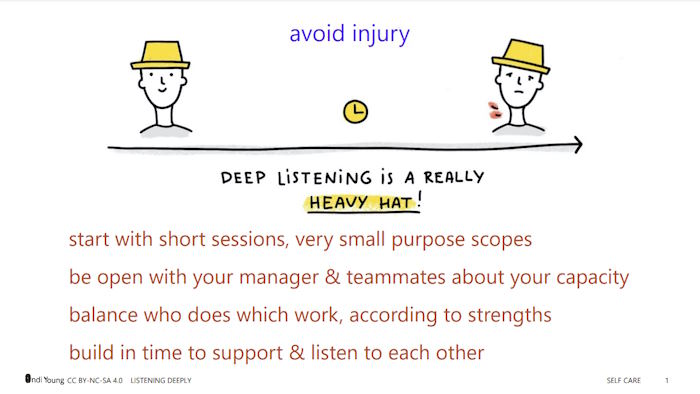
Who is this for?
If you are a researcher, a listening session is very different than an interview. Learn how to let the participant direct the conversation and how to encourage the participant to uncover a trio of concept types that provide the richness of understanding you need in your data.
If you are a leader or team member, listening deeply is how you build relationships, giving other people the gift of feeling heard. By understanding their guiding principles, you are able to collaborate more effectively, with less strife and misunderstanding.
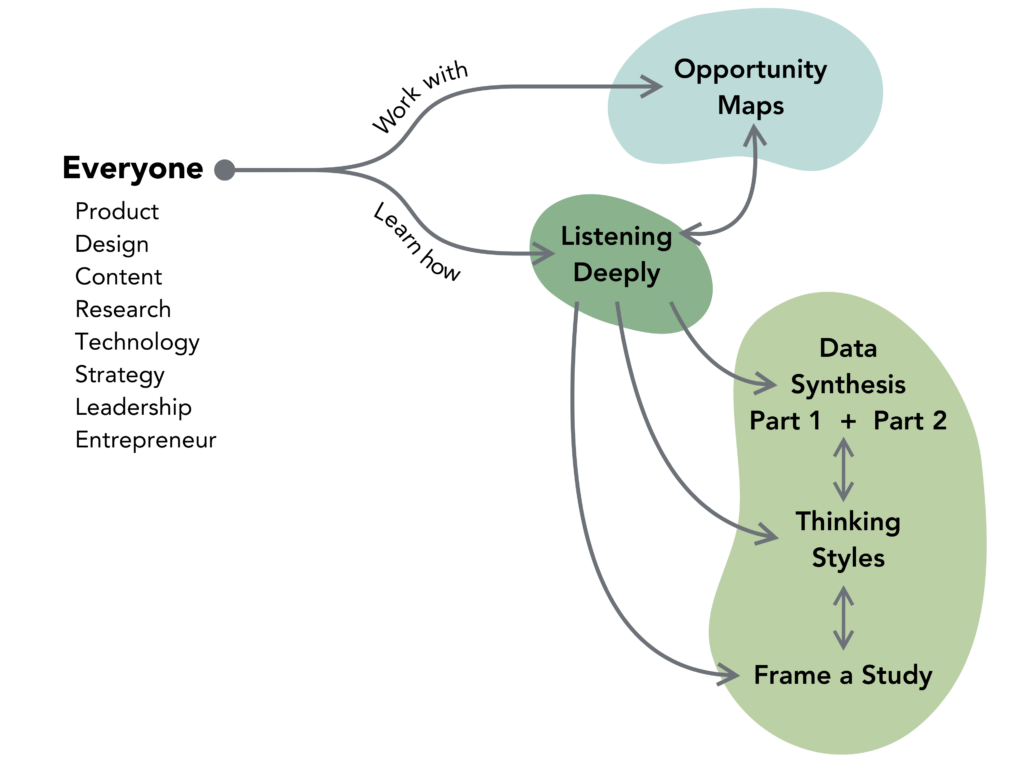
Course Features
- 46 videos, in 4 sections
- Total video time: 11.25 hours
- Demos and examples
- Practice, reflections & quizzes
- Closed captions
- Listen w/ or w/out the screen

Price levels – Listening Deeply
SOLSTICE SALE 50% off, 20-21 June 2025
see discount codes in posts and newsletters
Click here to compare courses for your role
Testimonials
I already had read the books and some articles, so watching these sessions motivated me to practice and see what I can get done with the listening sessions.
— Renato Caliari, 21-Jun-2018
After your deep listening training you’ll be equipped with a set of techniques that you can practice while talking to people. It takes time for them to internalize, as indi herself mentions. She still practices.
You’ll learn really deep foundational kind of research techniques and even get to practice them via…— Raghav Agrawal, 2-Nov-2018
Read more
The course Listening Deeply a great way to learn how listening skills are strong techniques for developing empathy. Indi has written a book about listening sessions, which is great too! I highly recommend both!
I took the Listening Deeply course in hope of improving how things are done at work, and…— anonymous, 2-Nov-2018
Read moreListening sessions are unlike any other design research that we’re used to. They have more in common with formal ethnography or therapy rather than with user interviews. But that shouldn’t scare you away. This makes them truly worthwhile.
Listening sessions are a very challenging and rewarding approach, whether your purpose is…— Sonja, 14-Nov-2018
Read more
There is no other training like this for user researchers that want to learn how to listen, understand, and empathize with people.
Be sure to make enough time to see the recordings. Plan to watch them twice to make sure everything is well understood.
Consider a group discount to get training with…— Maria P. Arrilucea, 2-Nov-2018
Read moreEveryone in Design should sign up – writers, editors, researchers, designers, design leads – because we can all learn from listening deeper! So often we’re loaded with our own assumptions in all the conversations we come to.
This course has helped me to be more aware of my own judgements, assumptions,…— Pei Ling Chin, 26-Aug-2019
Read more
Frequently Asked Questions
Q: If I have questions about the course content, will Indi answer them for me?
A: Asking a question in the Slack community will give Indi, her team, and many other Slack members a chance to see the question and respond to it.
Q: Do the recordings qualify me for Indi’s Problem Space Certification Program?
A: Not quite. You will also want to join the Live Practice series for each course. In these Live Practice meetings, you get to work on exercises together with Indi and others. This is where we discuss nuances of context and share experiences that help others prepare to conduct their own research. Live Practice meetings give you a chance to double your knowledge and demonstrate your understanding.







